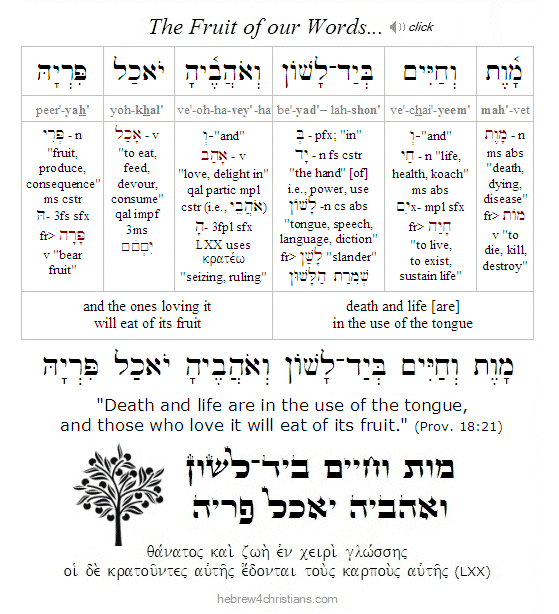|
OUR ABILITY TO USE LANGUAGE is perhaps what most differentiates us from animals -- and what most closely links us to God Himself. Indeed, words (devarim) and rationality (הִגָּיוֹן) are central to tzelem Elohim, the image of God, even as Yeshua represents this image most perfectly as devar Elohim (דְּבַר הָאֱלהִים), the "Word (λόγος) of God" (Heb. 1:3, John 1:1). Just as the Word of God resounded, "Let there be Light, and there was Light (Gen. 1:3), so our words are the medium of how we experience and understand reality. Words, then, are powerful and can bring forth light and life, though tragically, they can cause darkness and death, too. As it is written in Proverbs: מָוֶת וְחַיִּים בְּיַד־לָשׁוֹן / "Death and life are be'yad lashon - in the "hand of the tongue," an idiom meaning under the control of the tongue (Prov. 18:21):
מָוֶת וְחַיִּים בְּיַד־לָשׁוֹן
וְאהֲבֶיהָ יאכַל פִּרְיָהּ
mah·vet · ve·cha·yeem · be·yad · lah·shohn
ve·oh·ha·vey·ha · yoh·khal · peer·yah

"Death and life are in the power of the tongue,
and those who love it will eat its fruits" (Prov. 18:21)

 |
Our words (and the thoughts they express) have vast spiritual significance and repercussion... Because we are made in the image and likeness of God, words wield spiritual power. Indeed, the Hebrew word for "word" (דָּבָר) also means "thing." When we bless others, we are invoking grace and good will to be manifest in the world, but when we curse others, the opposite effect is intended. The phrase, "those who love it will eat its fruits," suggests that as we speak, think, and imagine, so will come to us: we will eat the fruit of our words and their consequences....
The midrash notes the morphological similarity between the word devarim (דְּבָרִים, words) and devorim (דְּבוֹרִים, bees). The words of Torah can give joy and sweetness to those who heed them (Psalm 19:10), but they are a deadly poison to those who do not: "Just as the honey of the bee is sweet and its sting is sharp, so, too, are the words of Torah." Likewise, our words can either be used to build up, edify, and comfort others, or they can be used to tear down, deliver poison, and cause pain. Most cases of violence - domestic or otherwise - begin with verbal abuse...
Hurting others with our words is regarded as a terrible sin (lashon hara) that is linked with spiritual leprosy (i.e., tza'arat). One who publicly embarrasses another so the person's color changes (i.e., either blushes or turns ashen) is judged as if he spilled blood. This is sometimes called ona'at devarim, i.e., "stealing words" in service to a critical spirit that humilates or debases others. It is a sort of "soul murder" and its practitioners are likened to verbal terrorists. Yeshua said that calling someone an "empty-headed fool" (ῥακά) puts you in danger of moral condemnation, but calling someone a "rebel" or "godless person" (μωρός) puts you in danger of eternal damnation itself (Matt. 5:22). This is "like-for-like" justice. Our words of criticism reveal an illegitimate sense of self-righteousness that turns a blind eye toward our own defects of character. Yeshua advises: "Let what you say be simply 'Yes' or 'No'; anything more than this comes from evil" (Matt. 5:37).
In Pirkei Avot we read, "If there is no Torah study there is no proper conduct; if there is no proper conduct there is no Torah study. If there is no wisdom there is no fear of God; if there is no fear of God there is no wisdom... If there is no flour (sustenance) there is no Torah; if there is no Torah there is no flour" (Avot 3:21). In other words, reverential respect precedes Torah, and our actions (and this includes our use of words and the underlying thoughts and attitudes they express) always trump the mere profession of faith upon our lips. Joy, like true love (or a cough), cannot be hidden... "He [Ben Azza] would say: Do not scorn any man, and do not discount anything. For there is no man who has not his hour, and no thing that has not its place" (Avot 4:3).
It's been said that "hurt people hurt people." Embracing the truth that you are of infinite worth and dignity is the first step of deliverance from a heart of malice and ill-will. May it please the Lord to give us a "good eye" -- and a heart that affirms words of life, love and grace both for ourselves and for others. "Let the words of my mouth, and the meditation of my heart, be acceptable in thy sight, O LORD, my Rock and my Redeemer" (Psalm 19:14).
Note: There is a Tishah B'Av and Rosh Chodashim connection with all of this, chaverim. The sages say that it was on account of "baseless hatred" (i.e., sinat chinam, שִׂנְאַת חִנָּם), that the Temple was destroyed and the Diaspora was decreed (Talmud: Yoma 9b). But note that sinat chinam literally means "hatred of [their] grace (חֵן, chen)." In essence, then, sinat chinam is the rejection of God's grace. This means envy or even jealously of the goodness we see in others, that is, ona'at devarim, the "stealing of words" in service to a critical spirit... In this case, however, the criticism was directed against Yeshua Himself, the embodiment of God's grace, and therefore sinat chinam represented a rejection of Him... Is it any wonder, then, that Yeshua foretold the destruction of the Second Temple based on Israel's rejection of Him (Matt. 24:2)?
|




